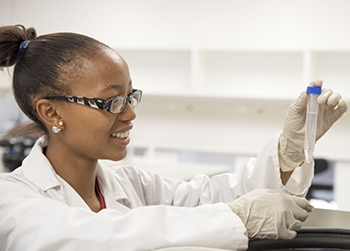Want to make a difference in the world? Here is how.
Video
Student Bursary Fund Campaign booklet (pdf)
Donate
Student Bursary Fund Campaign launched: #FundAFuture and make a difference
Motho ke motho ka batho. A person is a person through others
We live in a world filled with want. Often, we ache to make a difference, but become overwhelmed and despondent when we look into this chasm of need. However, the University of the Free State (UFS) has created a way for each of us to change lives, in much the same way that the life of Nozi Bonje has been changed.
“Through the opportunities given to me, I realised that you don’t have to be defined by the school you went to. You can do so much more – and you can dream big dreams and realise them.” |
Then
The early chapters of Nozi’s life story reveal a shy girl, hiding between the pages of her books on the playground of a township school. With barely a whisper, Nozi was slipping into a desolate future where dreams existed only in sleep.
Now
Today, that timid young girl has grown into a woman who throws her head back in effortless laughter, confidence sparking off her in bright arcs. What changed the trajectory of her future? Financial support for a tertiary education altered Nozi’s life permanently.
“If I didn’t go to university, I would have been this sad little person,” she remarks. “Studying is not just about learning from a textbook, though. It also challenges you to think critically. You start seeing things in a different perspective, and respond differently.”

Nozi Bonje
Photo: Sonia Small |
Giving back
Funding enabled Nozi to obtain a BSc degree in Human Molecular Biology at the UFS in 2015. She was one of the top students in her class. Inspired and driven, she is currently pursuing an honours degree in Molecular Genetics, also at the UFS.
“My main dream is to make a difference in people’s lives. For me, it’s all about giving back, because so many people helped me throughout my journey.”
Student Bursary Fund Campaign
In order to help increase the number of lives transformed through higher education – such as Nozi’s – the UFS has established the Student Bursary Fund Campaign. This campaign aims to raise money to fund talented, deserving students who lack the financial means of obtaining a university degree. We cannot do this alone, though.
Your support is crucial.
Each contribution will bring us closer to our goal while changing the future of our youth. Visit our Giving page for ways to donate.